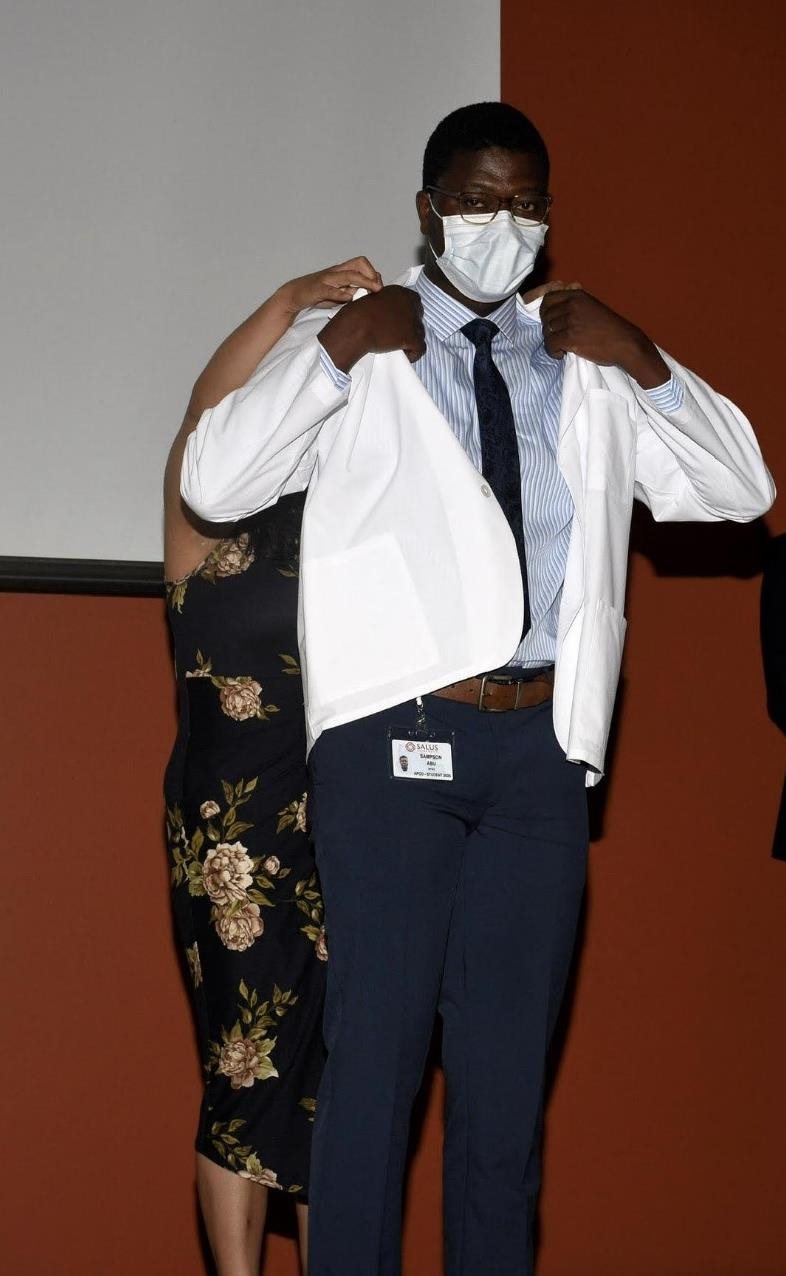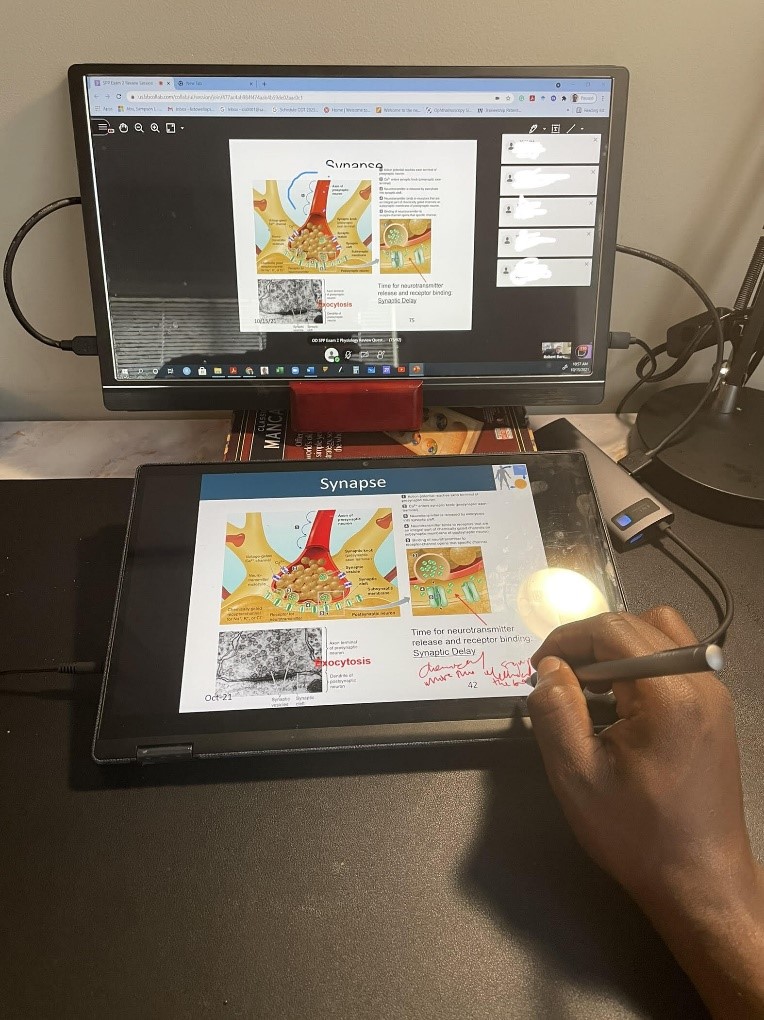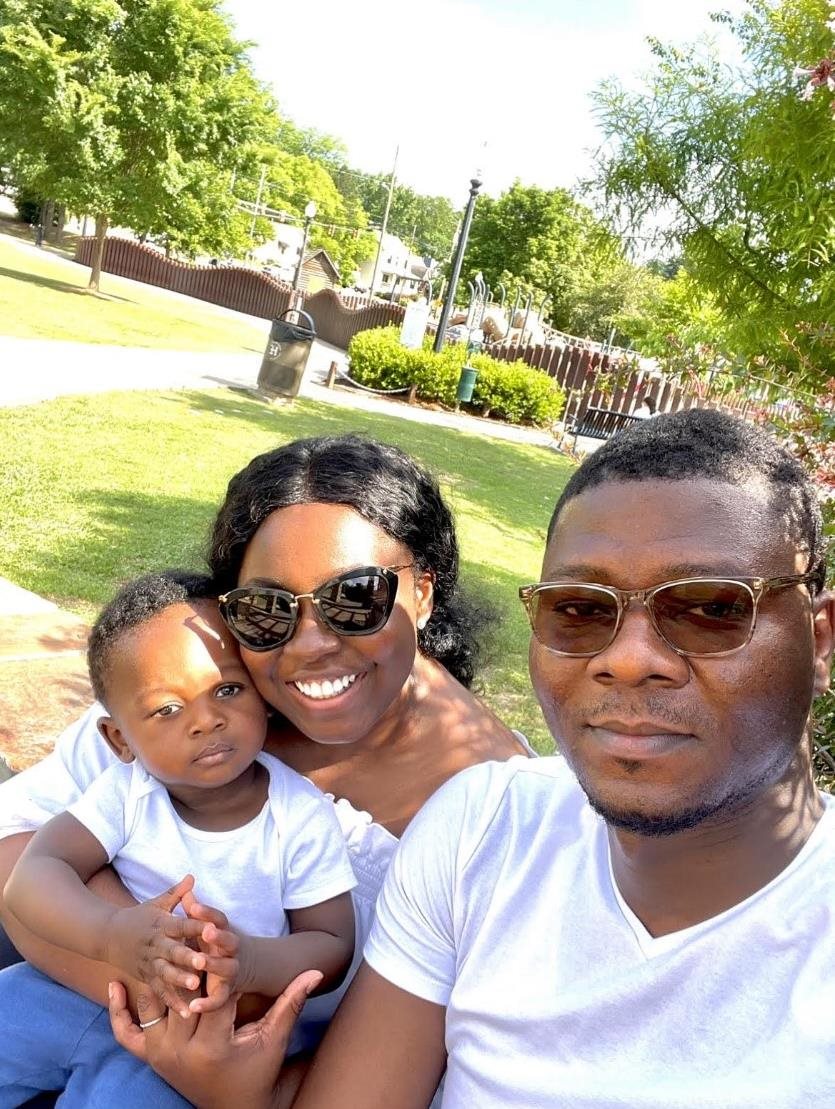Hello! I am Sampson L. Abu, a first-year student in the Advanced Placement Doctor of Optometry (APOD) program, class of 2025. I come from Ghana, West Africa. I am married and have an almost two-year-old toddler (he is the King of our house—we just follow his orders).
 Briefly, about my educational background, I earned my OD degree from the University of Cape Coast, Ghana, after completing a six-year post-secondary optometry curriculum in 2015. I practiced in Ghana for nearly two years in both academic and private clinical settings. In 2017, I moved to the United States to pursue a postdoctoral research fellowship under the mentorship of Dr. Lyne Racette at the University of Alabama at Birmingham. My research focused on early detection of glaucoma progression.
Briefly, about my educational background, I earned my OD degree from the University of Cape Coast, Ghana, after completing a six-year post-secondary optometry curriculum in 2015. I practiced in Ghana for nearly two years in both academic and private clinical settings. In 2017, I moved to the United States to pursue a postdoctoral research fellowship under the mentorship of Dr. Lyne Racette at the University of Alabama at Birmingham. My research focused on early detection of glaucoma progression.
I grew up in a close-knit family of eight, and there was always a sense of fulfillment when we helped and looked out for each other. So, when I began to look into career options, I pivoted toward professions that would allow me to be of service to others. Choosing an optometric career, specifically, was largely influenced by seeing my grandmother lose her independence as she gradually became blind due to a ‘whitish substance’ in her eyes. I came to learn in optometry school that those ‘whitish substances’ in her eyes were cataracts and with a simple surgery she would have regained her vision and independence. To date, the thought of the many others whose quality of life could be restored or improved by an optometrist urges me on.
I shadowed a few U.S.-trained ODs during my postdoc training and noticed the advanced scope and the level of clinical competency at which they practiced. Desiring to practice at that highest standard of clinical competency, I decided to further my education. This year’s white coat ceremony was a solemn moment for me because it symbolized my new journey despite being delayed for two years. It has been about several weeks since classes started, and I feel very engaged and still excited about the basic courses I am taking. I think my favorite course this semester is “Head and Neck Anatomy” partly because of my interest in visual neurodegenerative diseases and how the course itself is taught— the use of MRI and CT images to illustrate anatomical landmarks is impressive. I enjoy the Clinical Skills lab sessions where we learn and practice optometric clinical procedures. And, I think the Simulation Lab is also amazing.
Now, I will try to paint a picture of a typical day as an APOD student, starting with the night preceding a typical day because I love ‘bedtime.’
10:30 p.m. (of preceding night): I wrap up studying and go to bed around this time. I try to catch at least six hours of sleep each night but it may be shorter if I have an exam the next day.
 5:00 a.m. — 6:20 a.m.: I wake up around 5.00 a.m. each morning, freshen up/shower and proceed to my study area. I spend an hour preparing for the first class of the day. I would either watch a previous lecture or read through the lab manual if I have a lab session that morning. This usually happens on Tuesdays when I have both Clinical Skills and Ophthalmic Optics lab before noon.
5:00 a.m. — 6:20 a.m.: I wake up around 5.00 a.m. each morning, freshen up/shower and proceed to my study area. I spend an hour preparing for the first class of the day. I would either watch a previous lecture or read through the lab manual if I have a lab session that morning. This usually happens on Tuesdays when I have both Clinical Skills and Ophthalmic Optics lab before noon.
6:30 — 7:15 a.m.: I get my son ready for daycare while my wife makes breakfast. My wife works remotely which is a good thing because she does not have to rush in the morning. For most days, we try to have breakfast together and talk for a while.
7:20 — 8:00 a.m.: I set off for campus but first, I drop off my son at daycare. That five minute drive is fun. I play his favorite song (wheels on the bus) and we sing along. I then proceed to campus, which is about 25-30 minutes depending on traffic. On my way to campus, I continue to listen to recorded lectures on Panopto.
8:00 a.m. — 12:00 p.m.: I usually have two classes between this period. If it is a pre-recorded lecture on Panopto as is the case for Head and Neck Anatomy and General Anatomy courses, I head to the Learning Resource Center (library), put on my headphones and listen to the lecture at 1.5X speed (not too slow and not too fast). So, I am able to finish watching the pre-recorded lectures in about an hour and 30 minutes. I use the remaining half hour to review the PowerPoint slides for that lecture.
12:00 p.m. — 1:00 p.m.: Lunchtime! I don’t miss, except for days that I have an exam in the afternoon, then I’d continue studying in the library. The library is a great place to study. There are spacious rooms with whiteboards, nicely set up for group studies. There are many cubicles with electric outlets as well for private studies.
1:00 p.m. — 5:00 p.m.: The activities here are similar to the morning period. The entire first year class is broken up in four sections, A-D, so some sections have their anatomy lab sessions in afternoon. Because my labs are usually in the morning, I study for upcoming exams in the afternoon when I don’t have a scheduled lecture.
 5:00 p.m. — 5:30 p.m.: I pick up my son from daycare and then drive home. While driving home, I listen to some good Ghanaian Hi-life music—my favorite are the classics from the 1960s to 1980s. There are times that I would to return to the lab in the evening to complete an evening assignment for Clinical Skills lab or Ophthalmic Optics lab. On those days, I pick up my son earlier, get home by 4:00 p.m. and then return to campus by 6:00 p.m.
5:00 p.m. — 5:30 p.m.: I pick up my son from daycare and then drive home. While driving home, I listen to some good Ghanaian Hi-life music—my favorite are the classics from the 1960s to 1980s. There are times that I would to return to the lab in the evening to complete an evening assignment for Clinical Skills lab or Ophthalmic Optics lab. On those days, I pick up my son earlier, get home by 4:00 p.m. and then return to campus by 6:00 p.m.
5:45 p.m. — 7:00 p.m.: Time to relax and have dinner with the family. During this downtime, my wife and I talk about our day and catch up. My wife gets our son ready for bed around 7:30 p.m., so I start studying around this time. Friday evening is ‘family time:’ I try not to schedule anything school related.
7:30 p.m. — 10:30 p.m.: For most weeks, we have an exam Monday morning and Friday morning, so I am able to plan which course to study. I study with two screens. Our in-person classes/lectures are recorded as well. So, when I am studying, I have the recorded lecture playing on one screen and the slides on another. I go through the lectures at a slower pace and with intense concentration. I have a whiteboard at my study area which helps to solidify learned concepts by drawing certain pathways such as the visual pathway, blood supply to brain from the heart, etc. I also try to complete assignments and reflection papers around this time.
10:30 p.m.: You know what time it is. Bedtime. Yay!!
Weekends: I study on campus between 9:00 a.m. — 5:00 p.m. on Saturdays and hang out with the family from 5:30 p.m. On Sundays, we go to church from 10:00 a.m. — 12:00 p.m. When we get home, I take a two-hour nap. I start studying from 3:00 p.m. to 8:00 p.m. at my apartment’s clubhouse, which is usually quiet and conducive for studies. For weekends preceding weeks that I have no exam, we go to the park, visit family, or meet with friends. We went apple picking over the last two weeks, it was a fun time with the family.